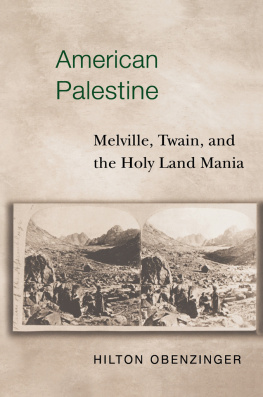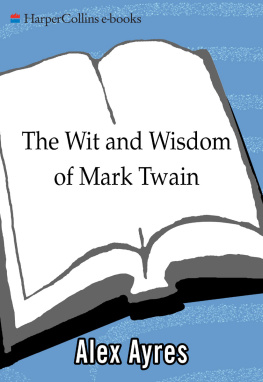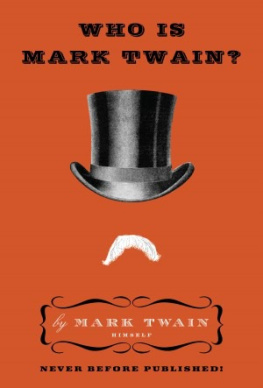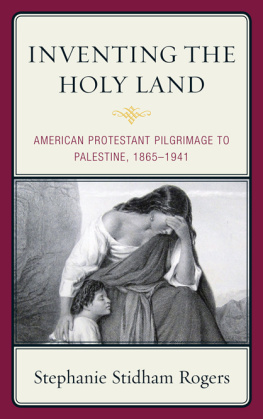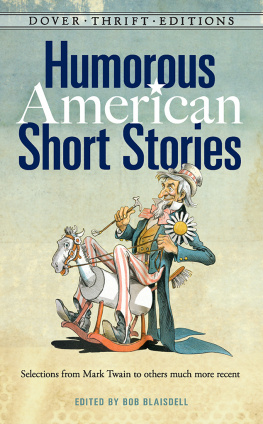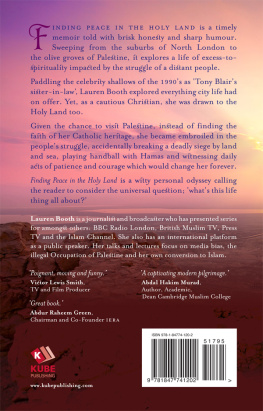Hilton Obenzinger - American Palestine: Melville, Twain, and the Holy Land Mania
Here you can read online Hilton Obenzinger - American Palestine: Melville, Twain, and the Holy Land Mania full text of the book (entire story) in english for free. Download pdf and epub, get meaning, cover and reviews about this ebook. year: 2020, publisher: Princeton University Press, genre: Romance novel. Description of the work, (preface) as well as reviews are available. Best literature library LitArk.com created for fans of good reading and offers a wide selection of genres:
Romance novel
Science fiction
Adventure
Detective
Science
History
Home and family
Prose
Art
Politics
Computer
Non-fiction
Religion
Business
Children
Humor
Choose a favorite category and find really read worthwhile books. Enjoy immersion in the world of imagination, feel the emotions of the characters or learn something new for yourself, make an fascinating discovery.
- Book:American Palestine: Melville, Twain, and the Holy Land Mania
- Author:
- Publisher:Princeton University Press
- Genre:
- Year:2020
- Rating:4 / 5
- Favourites:Add to favourites
- Your mark:
- 80
- 1
- 2
- 3
- 4
- 5
American Palestine: Melville, Twain, and the Holy Land Mania: summary, description and annotation
We offer to read an annotation, description, summary or preface (depends on what the author of the book "American Palestine: Melville, Twain, and the Holy Land Mania" wrote himself). If you haven't found the necessary information about the book — write in the comments, we will try to find it.
American Palestine: Melville, Twain, and the Holy Land Mania — read online for free the complete book (whole text) full work
Below is the text of the book, divided by pages. System saving the place of the last page read, allows you to conveniently read the book "American Palestine: Melville, Twain, and the Holy Land Mania" online for free, without having to search again every time where you left off. Put a bookmark, and you can go to the page where you finished reading at any time.
Font size:
Interval:
Bookmark:

American Palestine
American Palestine
MELVILLE, TWAIN, AND THE
HOLY LAND MANIA
Hilton Obenzinger
PRINCETON UNIVERSITY PRESS
PRINCETON, NEW JERSEY
Copyright 1999 by Princeton University Press
Published by Princeton University Press, 41 William Street,
Princeton, New Jersey 08540
In the United Kingdom: Princeton University Press,
Chichester, West Sussex
All Rights Reserved.
Library of Congress Cataloging-in-Publication Data
Obenzinger, Hilton.
American Palestine : Melville, Twain, and the Holy Land mania / Hilton Obenzinger. p. cm.
Includes bibligraphical references and index.
ISBN 0-691-00728-4 (alk. paper). ISBN 0-691-00973-2 (pbk. : alk. paper)
eISBN 978-0-691-21632-4
1. Melville, Herman, 18191891. Clarel. 2. PalestineForeign public opinion, AmericanHistory19th century. 3. American literature19th centuryHistory and criticism. 4. AmericansTravelPalestineHistory19th century. 5. Christian pilgrims and pilgrimages in literature. 6. Public opinionUnited StatesHistory19th century. 7. Melville, Herman, 18191891JourneysPalestine. 8. Twain, Mark, 18351910JourneysPalestine. 9. Twain, Mark, 18351910. Innocents abroad. 10. PalestineIn literature. I. Title.
PS2384.C53024 1999
810.9325694dc21
9920728
https://press.princeton.edu/
R0
For Estella Habal
Preface
Manias and Materialities
AFTER FIRST arranging in England for the British publication of The Confidence-Man, Herman Melville arrived in Palestine on January 6, 1857, as part of a modified Grand Tour of Italy, the Ottoman East, and Egypt. After nearly three weeks, much of it spent waiting for passage out of Jaffa, Melville departed. Throughout the course of the next two decades he mulled over the journal entries of that brief encounter, read Holy Land travel books, and recalled his time spent in Palestine. In 1866, at the start of his long tenure as an inspector for the New York Customs House, he began Clarel: A Poem and Pilgrimage in the Holy Land, composing the narrative poem intermittently during his first ten years on the waterfront, finally publishing it in two volumes with the financial backing of his uncle Peter Gansevoort in 1876. Most critics derided the lengthy, difficult poem; and so few readers dared to engage its agonized and agonizing religious dialogues couched in strangely constricted Hudibrastic verse that Melville would end up selling the balance of the unsold stock for pulp. He described Clarel as a metrical affair, a pilgrimage or what not, of several thousand lines, eminently adapted for unpopularityand unpopularity has been its fate ever since. Melville spent the rest of his days in growing obscurity, remembered if at all as the man who lived among the cannibals, the author of Typee, publishing nothing more in his lifetime other than small volumes of privately printed verse meant only for family and friends.
Samuel Clemens, only just beginning to be known as Mark Twain, departed Beirut on September 11, 1867, with a small party from the Quaker City tour to make his way overland via Damascus to Jerusalem. Mark Twain was engaged by newspapers in San Francisco and New York to supply a steady stream of correspondence from the Quaker City excursion, the first such tourist cruise to be organized, and the Wild Humorist of the Pacific Slope joined the staid members of the triumphant Northern commercial and industrial elite as they sought to reassert their Old World cultural legacy after the Civil War in their own extended Grand Tour, which included stops at Tangier, France, Italy, Greece, Russia, and Turkey, as well as the Holy Land and Egypt. As a consequence, Mark Twain entered the Holy Land as part of a very public performance, with his satiric commentaries, burlesque anecdotes, sly jokes, and bumbling exploits all served up as entertainment for an avid, overwhelmingly male readership; he would later adapt this material for a national, significantly more female audience, publishing The Innocents Abroad, or, The New Pilgrims Progress in 1869. Distributed house to house through the somewhat recent innovation of subscription sales, Twains fictionalized, satirical travel book became an immense success, selling, as Twain would remark, right along just like the Bible.Innocents Abroad would become the unofficial tour guide for Americans traveling to the Holy Land; they employed the book, as did General Grant on his world tour, right along with the Bible, assuring the popularity its author had first garnered with his vernacular tale of the celebrated jumping frog, thereby launching the career of Mark Twain, a trademark that would become far more celebrated than the Sam Clemens of its creation.
Both Holy Land books by Melville and Twain reach across the divide of the Civil War, as well as across vast differences in genre, reception, and status, as well as their roles in the careers of each author. While Clarel and Innocents Abroad have been read within the context of those distinct careers in other places, this study will regard Melvilles and Twains books in the different light of the ongoing preoccupation with the Holy Land that marked Anglo-American settler-colonial culture throughout the nineteenth century. Both books are part of a subgenre or field of American Holy Land literature based on direct travel to Palestine, a literature in which representations, controversies, and anxieties involving the certainties of religious and national identities contend upon a heightened field of mythic meanings, with all Holy Land books seeking in one way or other to appropriate Palestine for the American imagination. With America conceived as the New Jerusaleman association assumed metaphorically if not always enforced typologicallythe old Holy Land was encountered as a terrain of crucial cultural dynamics both challenging and reaffirming Americas narrative of settlement as divine errand.
Given this, Melvilles and Twains texts remain among the least representative while yet the most expressive and revelatory of the multitude of Holy Land books published before the first wave of Jewish colonization began to qualitatively alter Palestines political history along with the dynamics of the countrys representation in 1882. Although Melvilles narrative poem could be regarded alongside other biblical verse, such as that by John Pierpoint or Bayard Taylor, and Twains travel book could be placed alongside travel accounts by J. Ross Browne, William Prime, John Lloyd Stephens, Taylor, or others, what distinguishes both texts is the way each inscribes complex responses, even counternarratives, on the charged tablet that Palestine signified to the sensibilities of Anglo-American, Protestant travelers. Whether popular or unread, both texts engage in religious, cultural, racial, and nationalist discourses in unique ways, starkly revealing certain dark, anxious preoccupations of American culture.
This description intimates how easily what could be regarded as a preoccupation with the Bible and sacred geography could become a mania for those traveling to the Holy Land. In From West Africa to Palestine, for example, the early pan-Africanist Edward Wilmot Blyden recounts the story of a black American immigrant who arrived in Liberia in the late 1860s under the impression that, by some strange and supernatural revelation, he was commissioned to go to Jerusalem by land across the African continent. Dismissing all warnings, he raved and foamed at the mouth like a madman, insisting that he would travel beyond the last civilized town to reach the Holy City. Six months later the poor pilgrim was reported to have been killed in Ashantee country, and Blyden, about to embark on his own journey to the Holy Land, is compelled to warn how, of all crotchets in the world the most mischievous... are religious crotchets, bemoaning how otherwise reasonable men are guided by infallible suggestions to destruction. Blyden employs the unfortunate Americans tale at the beginning of his own account of his Holy Land travels in order to demarcate how he, at least, does not suffer from Jerusalem on the brain.
Font size:
Interval:
Bookmark:
Similar books «American Palestine: Melville, Twain, and the Holy Land Mania»
Look at similar books to American Palestine: Melville, Twain, and the Holy Land Mania. We have selected literature similar in name and meaning in the hope of providing readers with more options to find new, interesting, not yet read works.
Discussion, reviews of the book American Palestine: Melville, Twain, and the Holy Land Mania and just readers' own opinions. Leave your comments, write what you think about the work, its meaning or the main characters. Specify what exactly you liked and what you didn't like, and why you think so.

